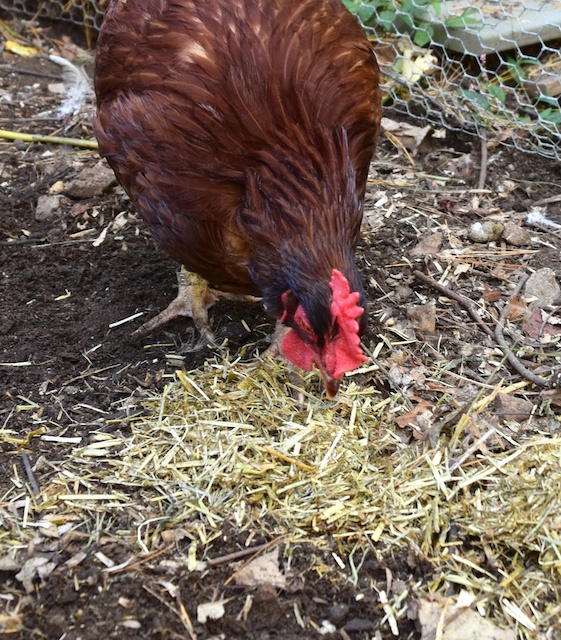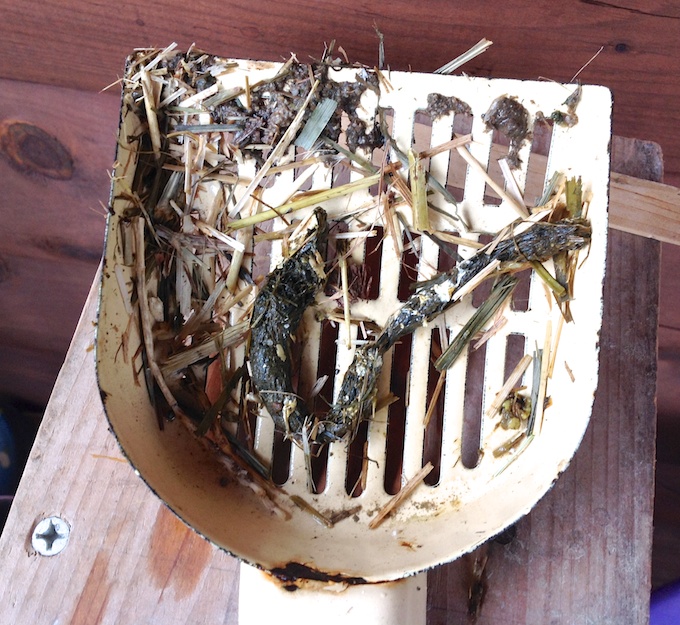On and off over the last couple of years, I’ve fed alfalfa from bales, and chopped alfalfa from bags, to my hens. My girls have benefited from the highly usable protein and calcium, as well as nutrients found in leafy greens.
When you feed roughage. there’s always a risk of impaction and intestinal blockage, however I feed the alfalfa as part of a balanced diet. My hens aren’t hungry and they have lots of interesting things to peck at in their compost piles. They leave most of the tough stalks and eat just the good bits. Also, they have access to grit, which is granite that’s been broken into small pebbles. Chickens eat these rocks, which go into the gizzard – that is the powerful muscular pouch where food is ground up. If chickens don’t have grit in their gizzards, they can’t digest food thoroughly.
I recently heard from a reader who found this odd pile of manure in her coop:
She also had a hen that was huffed up and looking uncomfortable, although she was still eating and drinking. A day after the hen passed this manure, she was back to normal. What’s going on? I found out that the reader had recently begun to feed alfalfa. There’s a chance that the eager hen ate too much of this new treat. I was also told that although grit is offered free-choice, that the only type available at her feed store was the fine stuff for chicks.
I dispense chicken keeping advise for a living and I take the responsibility of what I say very, very seriously. I base what I say on twenty years of hen keeping experience, plus lots of looking into primary research materials. But, I could be wrong. What works for my flock here in New England, on my soil, with my coop structures and management, might not work for you. If anyone else has issues with feeding alfalfa, do let me know!



What is your opinion on using Alfalfa pellets instead regular alfalfa?
I’m skeptical that it has the full nutritional value of the unprocessed leaves. But, that’s a guess. There’s no research.
teri – here’s a thought on alfalfa. and it doesn’t come with any research done on it by me – it’s just something i think.
alfalfa is great stuff. however, i think (underline that) that in the history of the keeping/feeding of chickens it’s a rather ‘new’ crop,
is there any history of chickens that would indicate their grain and roughage were from crops like oats, corn, whatever and the ‘green stuff’ was timothy hay or clover or something without alfalfa in it.?
Actually, I got the idea for feeding alfalfa from agriculture books and pamphlets put out around 1915. The hens don’t need the roughage, they need the leafy bits that are full of calcium and protein. Alfalfa is a legume. Hay (timothy and other grasses) have no value for hens except, perhaps, mature seed heads.
The only form of alfalfa available at feedstores in this area is alfalfa cubes. I was told by an experienced chicken keeper here that if I were to soak the cubes before feeding them to the chickens, that would minimize chances of crop impaction. It won’t help to keep them busy scratching about, but I suppose that at least they will have the benefit of additional protein and calcium. I was really encouraged when I read your blog post about feeding chopped alfalfa, but since that’s not an option, unless I were to buy from a farmer and chop it myself, I guess I’ll have to keep looking for something that will keep them entertained this winter.
Personally, I’m still feeding chopped alfalfa. I’ve had more crop problems with letting my hens free range and get into long grass than I have with alfalfa. That said, if worried, you could soak the chopped alfalfa before feeding. Or, not feed it at all – there are other sources for calcium and protein.
Something else to do with the leftover alfalfa stems: a local rose grower told me about the good things alfalfa does for roses. In particular, something in alfalfa encourages rose roots to send up new canes. I got a broken bag of alfalfa cubes for cheap last spring (I made sure that it didn’t have added salt!) and put about a cup around the drip line of several own-root roses — sure enough, they sent up lots more canes than usual.
Interesting! My hens don’t eat the tough stems and they go right into the compost. My roses did look good this year :)
After reading your post about feeding the chickens with alfalfa, I went to our local feed store and asks for this. The sales person said they don’t cary them. And she made a comment that she never heard of feeding chopped alfalfa to the chickens.? We lived in the PacNW.
I got the same response from people at local feed stores in our area – we are in South Eastern Ontario. Seems the only alfalfa products carried in our region are alfalfa cubes or alfalfa/timothy hay cubes.
Feeding alfalfa to hens fell off the radar when commercial feeds took over, so I’m not surprised that feed stores haven’t heard about it. However, dig on-line and in old books, and you’ll find that it was common back when every farm had a small flock out the backdoor and grew forage in local fields.
I might suggest buying a bag of pea gravel for grit.
I have processed many a older hen/rooster (many with plenty of free range time) in my day and you would be surprised the size of rocks among other things one finds in the gizzard.
I live in the PNW and I found small bales of weed free alfalfa at our local feed store…they are used for horse on the back country trails..it isn’t sweetened with molasses..just plain…but my chickens are eating it with no troubles, I do offer good grit for them..it keeps them busy in their compost area!
What you get would be my preference. I’ve found that in the past. Like you, I had no issues with impaction.
Our feed store only sells the alfalfa pellets that are usually used as bunny feed, but are valuable as compost for the garden. In the spring I combine them with Epsom salts and put them under my shrubs concentrating on the rose bushes. I water them into a mush. The chickens free-range so snack on this yummy treat. I have been using hay this year as mulch trying to build up some of my beds and add bulk to the soil. The chickens enjoy scratching it up etc. and so far they have not shown any indication of crop impaction. I sure hope that does not become a problem.
The second person to mention roses and alfalfa! A win for the roses and the hens – they won’t get impacted from a few pellets.
Hi Terry…..It was all the hay in the garden I was concerned about……:)
Oh! Thanks for the clarification :) My hens scratch around the goat and rabbits hay and are fine. But, there’s always that one hen… but I’d rather they get out in the garden than protect them from all possible problems.
I fed alfalfa a few years ago after reading an article about the benefits. Then several days later I read a chicken website thread that went on and on about impacted crop and how it was sure to happen. I was literally scared to death that night that I would have 60+ very sick chickens on my hands as soon as I awoke. They did fine. I usually add alfalfa in the winter when the girls lose their free ranging to the snow. I have soaked it but found it increased moisture in the coop for me. I understand impaction may happen, but they really do leave the woody pieces alone. It’s sort of how I feel about free ranging – the benefit outweighs the risk until something happens, then I reevaluate. Also, it’s something to keep the entire crew of birds busy and not picking at each other in the winter.
I appreciate the effort you give into giving out information that is true to the best of your knowledge. I feel like I know you from your website — I feel your love for the animals and your passion for sharing. Thank you! * And I am the oddball at my feed store (local mill), always asking to try this or that and they order it for me. I am sure all the while thinking, ‘she’s been reading again!’
It’s good to hear about your positive experience with alfalfa. I also think that the benefits outweigh the risks.
Unless they actually saw that come from the hen, I would swear up and down it looks like it comes more from a 4 legged friend, like a coon or possum, even more from a turtle. I don’t know but a smidgeon of what you know, but I seriously have never seen anything look like that come from a chicken. I actually feel sorry for the chicken, especially after the way I feel those times when my digestion goes south on me!
BTW, no expert on manure, but I do tend to stay in it a lot! :-)
Erney, I thought the same thing, that it was from some mammal sneaking around. But, she found it under the roost in a closed coop.
I always learn something new on your site. Thank you Terry! I have never fed Alfalfa to my girls. I provide fresh veggie scraps along with an cut apple and rolled oats with their breakfast daily.
I recently discovered they love grapes too! My girls are good eaters like their mother…lol! :)
In the summer, when my garden is in, I keep my hens in their own smaller yard. They always destroy the grass within the first month, and they won’t forage the weeds that come up in it’s place. I’ve been considering planting alfalfa in that yard in the spring for then to forage as they will. What are your thoughts?
Fresh alfalfa would be lovely for them, but they’ll destroy that like they scratch up everything else that grows :) But they’ll love it while it lasts!
Is there anything I can plant that they will eat, but not destroy? Besides pig weed that is. ;) I thought they would love the nasturtium I planted this spring. It’s gorgeous but they’re not eating any of it. I’ll also probably sow some oats next spring. I’ve dive red cover in the past, but it never came back for a second season.
If they’re confined to a pen, they’ll destroy all. However, if they free-range they don’t destroy established perennials. Take a look at vintage photos of the back porch areas of farmhouses and you’ll see packed dirt – mostly due to chickens :)
They have 800 sq feet in the summer when my garden is in. Right now it is full of plantain and pig weed.